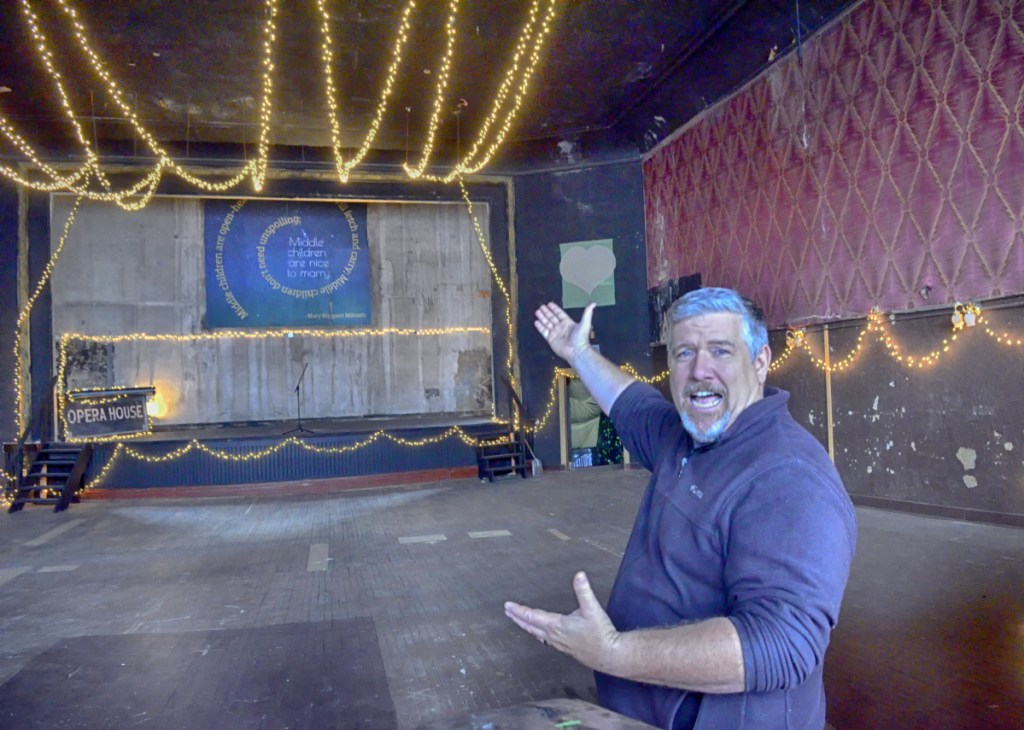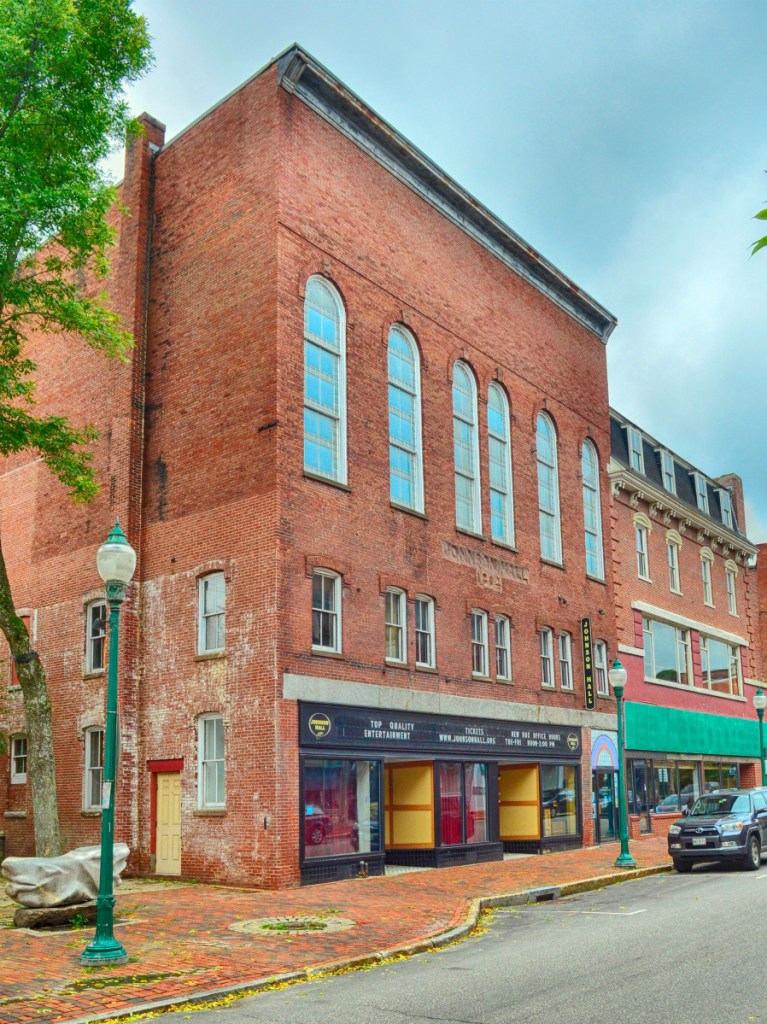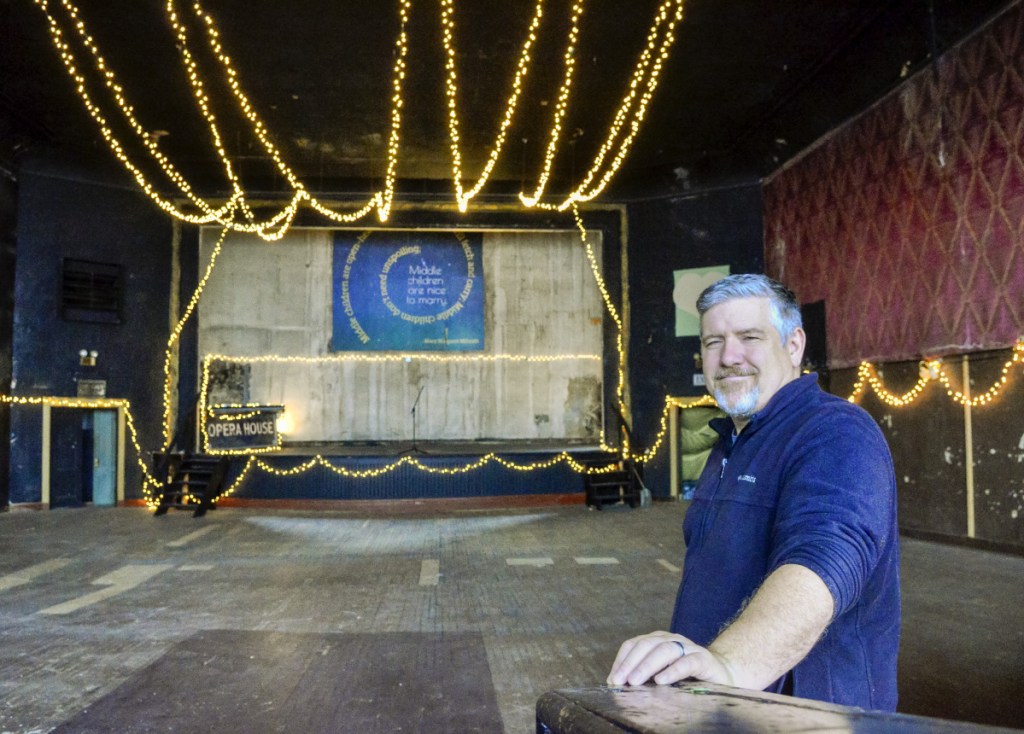GARDINER — With a donation from a longtime sponsor, Johnson Hall has reached the $3 million mark in its campaign to raise the money needed to renovate the performing arts center.
Steven Marson, the head of Central Maine Pyrotechnics and Pyrocity Maine Fireworks, said he made the $25,000 donation that put fundraising over that benchmark because he’s been around theaters a long time, and they are important to the communities where they’re located.
For the last three years, Marson has been a lead sponsor of the Johnson Hall’s free summer concert series, donating fireworks displays at the first and final shows of the season. He has renewed his sponsorship for the next three years.
“Downtown needs to get the theater open and operating,” Marson said. “It’s important to be supportive of something I believe in, and it brings a lot of activity to the city of Gardiner.”
A little more than two years ago, the theater launched its fundraising campaign with the goal of starting the renovation work in 2019.
When construction begins, plans call for rebuilding the 400-seat theater that occupies the upper floors of Johnson Hall, Maine’s oldest opera house. The project includes building a lobby and concession area on the second floor, along with performers’ dressing rooms and green rooms, and a full-service box office and foyer on the ground floor. The Studio Theater on the ground floor will remain open after the renovation is completed.
Johnson Hall launched its fundraising in earnest in 2016 with an announcement that Kennebec Savings Bank pledged to purchase all of the historic tax credits for which the project qualified. The bank also put together both construction financing and pledge financing packages, and committed $100,000 to the campaign. In February, theater officials announced they had reached the $1 million fundraising milestone.
Mike Miclon, executive artistic director for Johnson Hall, said when the capital campaign team met in March, it set the goal of raising $225,000 to reach the $3 million mark.
As part of that drive, Miclon said, the theater received a range of donations, including an anonymous gift of $100,000, but they were still short of the mark.
When Marson was agreeing to continue his sponsorship, he also announced the gift.
“That was the push to get us over the $3 million mark,” Miclon said.
As the theater’s fundraisers move forward, they are working toward a slightly higher goal. Initially, the projected total was about $4.6 million. But with increases in the price of steel, Miclon said, the target has moved to $4.9 million.
As of the end of last week, that leaves about $1.9 million to be raised.
“We plan to go to the public phase with 75 percent of the money raised,” Miclon said, and that point is only about $600,000 away.
Three initiatives are underway now to help complete the fundraising.
The first is accruing funds for a matching challenge — between $500,000 and $1 million — to give a lift to donors during the next phase.
The second is a fundraiser based on naming rights.
Miclon said knowing that a number of large-scale fundraising campaigns have been launched in the region, they have found a way to reach beyond the local area for possible donors.
To honor his mentors, Benny and Denise Reehl, who with partners bought Johnson Hall with plans to renovate it, Miclon said he’s reaching out to all the people who worked with the Reehls to raise enough money to name the stage for them.
When naming rights are sold, he said, they identify the corporation that has purchased them. In this case, Miclon said, the naming rights, worth $500,000 would identify the people who made the theater possible.
“They are the reason I am here,” he said. “I wanted to see this through.”
Miclon undertook an apprenticeship with them from 1982-1990. In the middle of that, the Reehls had relocated to Gardiner and raised money for the initial renovation, to dig out the floor and install beams upstairs, and install light and sound.
Benny died in 2005 and Denise stepped down as artistic director in 2012.
“We are going to be working really hard to get people who worked with Benny and Denise, and traveled with them and did shows with them to give money for the stage,” Miclon said. “They don’t have to care about Gardiner or even about Johnson Hall, but they do care about Benny and Denise.”
The third is a project to raise enough money to name the concession stand Rick’s Cafe.
“It’s open to anyone named Rick or wishes they were,” Miclon said.
Rick Dosedlo, co-chairman of the capital campaign, said when he proposed the idea, he was half-joking and but he was half-serious.
“It’s easier to find 100 Ricks to pay $1,000 each than it is to find one Rick to pay $100,000,” Dosedlo said.
The idea was kicked around for a while, and suddenly, he said, “It was a brilliant idea.”
Now Dosedlo is featured in a fundraising video that’s expected to launch this week, inviting anyone named Rick to donate.
“It’s a nice way for people to be recognized and we’ll see. Who knows?” he said. “Sillier things have gone viral.”
Along the with the naming right, the donors will receive a card that ensures their first beer at any show is free, Miclon said.
Dosedlo said the central Maine community is generous, and people give a lot.
But the analysis of ticket sales suggests that the community of Johnson Hall supporters extends beyond central Maine. Johnson Hall draws people from 116 municipalities in Maine and 25 states.
To get people to start to understand the caliber of performers the renovated Johnson Hall could attract, Miclon said he reached out to higher-profile acts and has booked Shawn Mullins, Livingston Taylor and Grammy-winner Paula Cole, along with mainstays like Slaid Cleaves and comedy and family shows.
“We’re going to see what that feels like,” he said.
Miclon said he learned a key lesson from the Reehls.
“Positively affect as much as you possibly can for the patron. Everything adds up to the overall experience,” he said. “How easy is it to get tickets? Was there a place to park? A place to eat?
“The show is one of the smallest parts of the overall experience,” Miclon added. “Our gross domestic product is the memory of the event. Then, absolutely, simultaneously, you do the exact same thing for the artist.”
When the electricity happens, he said, you can feel it.
“It’s happening more now,” Miclon said.
Jessica Lowell — 621-5632
Twitter: @JLowellKJ
Send questions/comments to the editors.







Comments are no longer available on this story